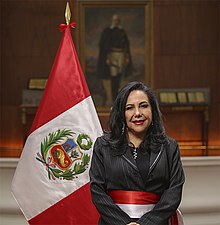| Gloria Montenegro | |
|---|---|
 | |
| Minister of Women and Vulnerable Populations | |
| In office 11 March 2019 – 6 August 2020 | |
| President | Martín Vizcarra |
| Prime Minister | Salvador del Solar Vicente Zeballos Pedro Cateriano |
| Preceded by | Ana María Mendieta |
| Succeeded by | Rosario Sasieta |
| Member of Congress | |
| In office 27 July 2016 – 30 September 2019 | |
| Constituency | La Libertad |
| Mayor of Trujillo | |
| In office 23 April 2014 – 31 December 2014 | |
| Preceded by | César Acuña |
| Succeeded by | Elidio Espinoza |
| Personal details | |
| Born | (1956-03-30) 30 March 1956 (age 68) La Unión, Huánuco, Peru |
| Political party | Alliance for Progress (2014-2019) Purple Party (since 2020) |
Gloria Edelmira Montenegro Figueroa (born 30 March 1956) is a Peruvian politician. She served as the Minister of Women and Vulnerable Populations in the presidency of Martín Vizcarra.
Early life and education
Montenegro was born on 30 March 1956 in La Unión, Huánuco. She grew up in Chiclayo then moved to Lambayeque, where she studied accounting and administration at the Universidad Nacional Pedro Ruiz Gallo.
Political career
In 2006, Montenegro was elected councilwoman (regidora) in Trujillo City Council; four years later she was elected deputy mayor of that city. In May 2014, she was appointed mayor of Trujillo (alcaldesa provincial) after her predecessor César Acuña resigned so that he could run for election to governor of the Department of La Libertad. She was mayor until the end of the year.
As a member of the Peruvian party Alliance for Progress, Montenegro was elected to congress in the 2016 elections in Peru. She was elected as a member for La Libertad for the legislative period from 28 July 2016 to 28 July 2021. On 11 March 2019, she was appointed Minister of Women and Vulnerable Populations, succeeding Ana María Mendieta.
After President Martín Vizcarra dissolved Congress on 30 September 2019, she and the other congressmembers lost their seats. Early new elections followed on 26 January 2020, in which the 130 seats in Congress were redistributed until the end of the legislative period. Montenegro was not re-elected. She remained Minister for Women and Vulnerable Populations until 6 August 2020. Three days earlier, Prime Minister Pedro Cateriano was ousted by a vote of no confidence. As a result, the new Prime Minister Walter Martos filled the cabinet. He appointed Rosario Sasieta to succeed Montenegro. In October 2020, she joined the Purple Party after having previously left the APP.
Citations
- "Entry on the website of the Peruvian Congress". Archived from the original on 3 March 2020.
- ^ "Gloria Montenegro se inscribió en el Partido Morado". Diario Correo (in Spanish). 5 October 2020. Retrieved 16 December 2020.
- "Gloria Montenegro es oficialmente alcaldesa de Trujillo". RPP (in Spanish). 14 May 2014. Retrieved 16 December 2020.
- "Congresista Gloria Montenegro sí cobrará S/. 15 mil 600 por gasto de instalación". RPP (in Spanish). 5 July 2016. Retrieved 16 December 2020.
- "Gloria Montenegro es ratificada como titular de la Mujer y Poblaciones Vulnerables". Plataforma digital única del Estado Peruano (in Spanish). 3 October 2019. Retrieved 16 December 2020.
- "Rosario Sasieta jura como ministra de la Mujer en reemplazo de Gloria Montenegro". La Industria (in Spanish). 6 August 2020. Retrieved 18 December 2020.